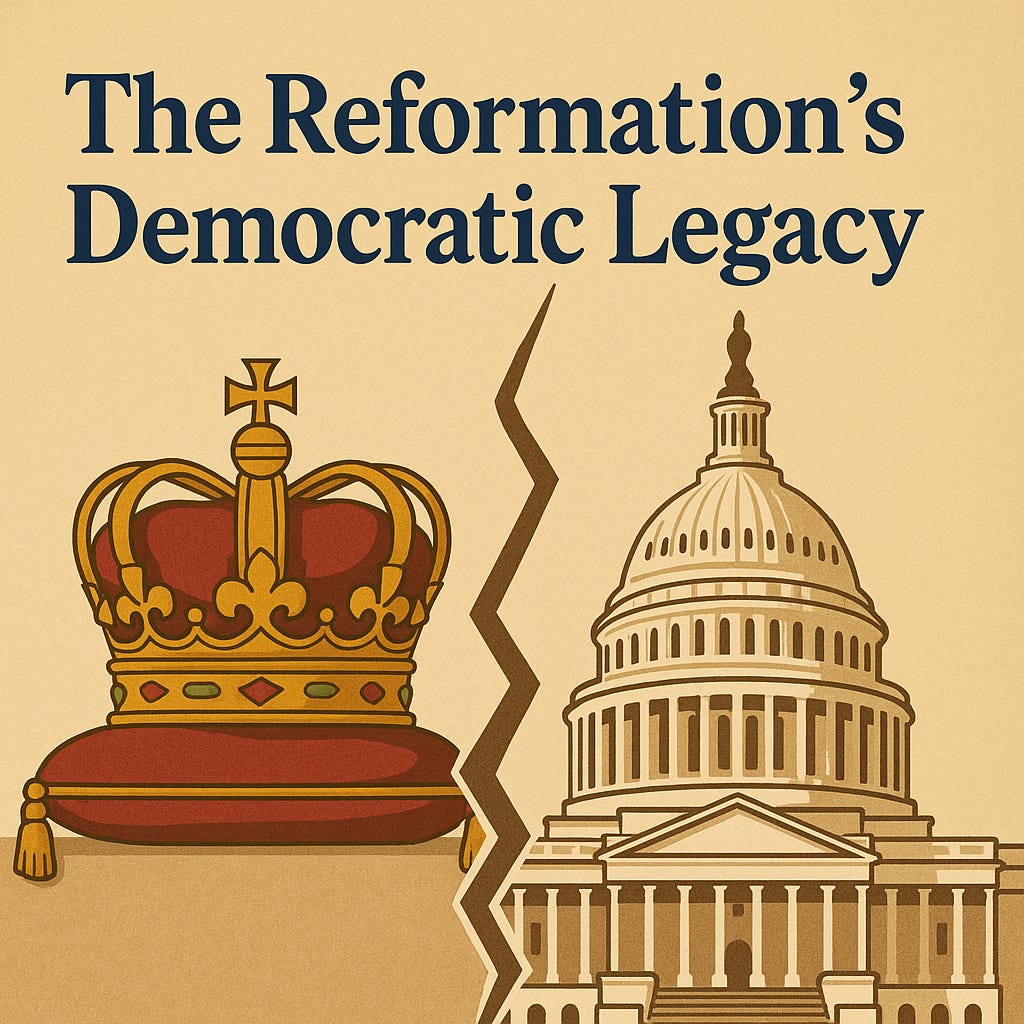By Michael Peabody, Esq.
A walk through Washington, D.C., can stir something uniquely American. Beneath the shadows of monuments and along the edges of the National Mall, a quiet but persistent idea takes hold. The child standing in front of the White House is not excluded from imagining themselves inside it. They are not barred by bloodline or divine decree. There is no crown, no royal lineage to bow before. The office of President is not inherited. It is attained, often after much struggle, but attainable nonetheless. That sentiment, that aspiration, marks a profound break from the world of kings and inherited rule. It is the fruit of theological and political convictions shaped over centuries, beginning most significantly with the Protestant Reformation.
In the United Kingdom, the monarchy stands as a figure of national continuity. It commands ceremony, tradition, and symbolism. But no child from an ordinary home is ever told they might grow up to be king or queen. That privilege belongs to those born into a predetermined line. The difference between Washington and Westminster is more than aesthetic. It reflects a fundamental divergence in how authority is understood. In the British monarchy, power is tied to birthright. In the American republic, power is supposed to answer to the people. That difference did not emerge by accident. It has deep theological roots.
The doctrine of the divine right of kings once held that monarchs ruled by the direct appointment of God. To challenge the king was to challenge heaven. Religion was enlisted to sanctify power, and disobedience became not just a civic offense but a spiritual one. The Protestant Reformation struck at the heart of this arrangement. When Martin Luther declared that salvation came by faith alone and that Scripture held ultimate authority, he challenged both the ecclesiastical structure of the Roman Church and the political order that depended on it.
The Reformers introduced a vision of humanity that placed individual conscience at the center. The believer no longer needed an intermediary to approach God. This theological conviction had enormous political implications. If each soul is directly accountable to God, then no earthly authority can claim to rule with unchecked divine sanction. Kings became subject to criticism, and religious conformity enforced by the state became suspect.
This shift in thinking eventually crossed the Atlantic. The early American colonists were often members of dissenting Protestant sects who had suffered under the intertwining of church and crown. They brought with them not just a desire for freedom but a memory of what happens when power and religion become indistinguishable. Their answer was not rebellion for its own sake, but a structured rejection of inherited authority and imposed belief.
The Constitution they crafted did not rely on inherited titles. It rested on consent and accountability. The Bill of Rights, particularly its provisions for religious liberty, drew directly from the Protestant insistence that conscience must be free. The First Amendment was not a denial of religion. It was a safeguard for faith against government control. Religious belief was protected not because it was marginal, but because it was central and too important to be manipulated by political authorities.
The President, unlike a monarch, is elected. The office is subject to law, limited in time, and open in principle to every citizen. This vision did not abandon faith. It was shaped by it. The Reformation taught that truth does not require compulsion. It taught that no individual, however exalted, can claim God’s authority for their own unchecked power.
When we visit Washington and hear the idea that any child might one day be President, we are witnessing the legacy of that theological upheaval. We are living in a society formed not only by Enlightenment rationalism but by Reformation theology. The rejection of monarchy was not just political. It was spiritual. It was a declaration that no human authority should ever be mistaken for divine. And it was a commitment to the idea that conscience, once awakened, must be free.
Please like, share, and subscribe. It really helps.
